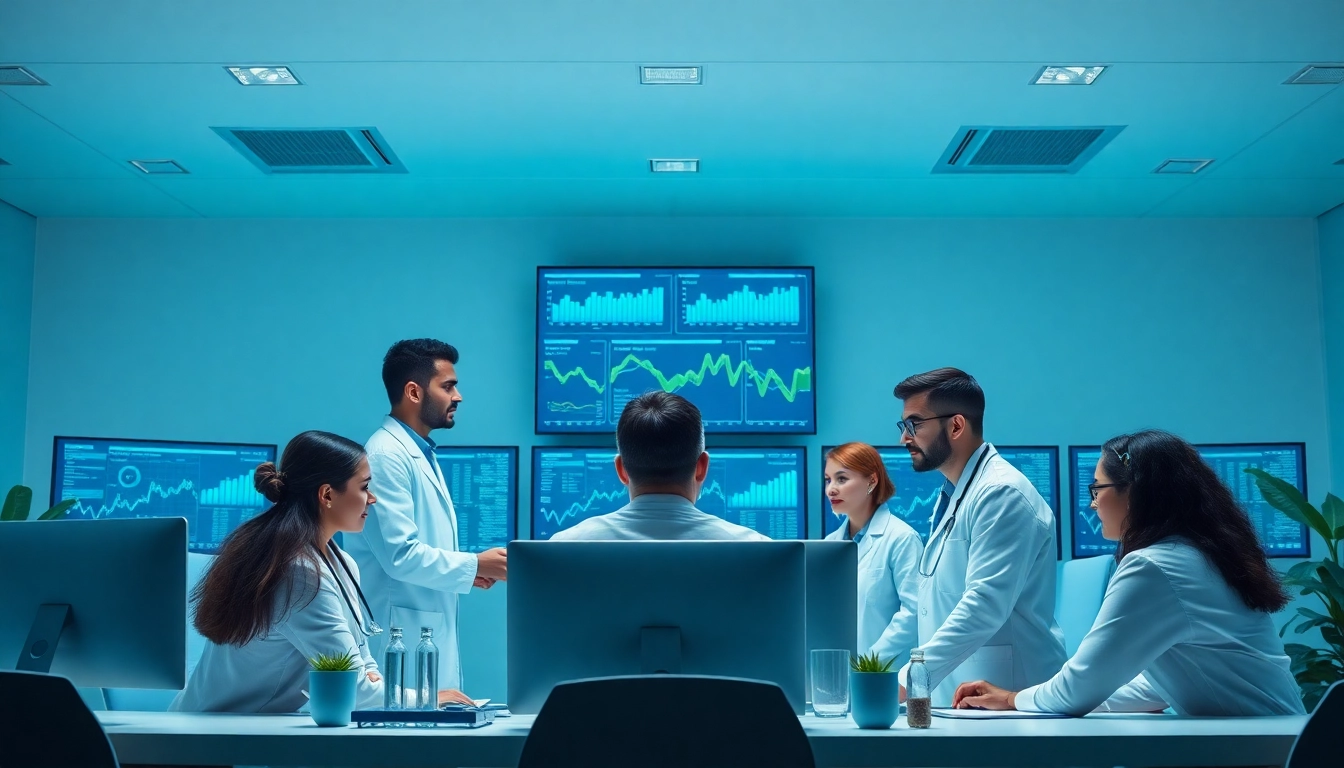Understanding Informatics and Its Role in Healthcare
What is Informatics?
Informatics is a multidisciplinary field that involves the study and application of data, information systems, and communication technologies to improve human health. It encompasses various domains, including health informatics, which specifically focuses on managing healthcare data and enhancing patient care outcomes. Informatics combines principles from computer science, information theory, and social sciences to create innovative solutions for managing and processing health-related information. By harnessing technology and data analytics, informatics can facilitate the betterment of healthcare delivery, improve the safety, and increase efficiency within the healthcare system. For a deeper insight into this transformative field, you can explore the resources available on https://www.informaticsview.com.
Importance of Informatics in Patient Care
The role of informatics in patient care cannot be overstated. It serves as a backbone for implementing evidence-based practices and supports clinical decision-making processes. Through the collection and analysis of data, healthcare professionals can identify patterns, predict outcomes, and customize treatment plans to meet individual patient needs. Furthermore, informatics systems enable the integration of patient records and streamline communication between different healthcare providers, which is crucial for coordinated care.
By facilitating access to accurate and timely information, informatics enhances medication management, reduces errors, and improves overall patient safety. Moreover, patient engagement tools powered by informatics allow individuals to take more active roles in their healthcare, fostering better adherence to treatment plans and healthy lifestyle choices.
Key Concepts in Healthcare Informatics
Several foundational concepts underpin the practice of healthcare informatics, including:
- Data: The raw facts and figures gathered from various healthcare interactions, which can be transformed into meaningful insights.
- Information: Data that is processed, organized, and structured to provide context and meaning, helping healthcare providers make informed decisions.
- Knowledge: The application of information through experience, enabling clinicians to interpret data effectively to improve patient outcomes.
- Interoperability: The ability of different information systems to communicate and exchange data seamlessly, enhancing data sharing across various healthcare platforms.
- Health Information Technology (HIT): The electronic systems designed to gather, store, analyze, and exchange health information, which are fundamental in facilitating informatics processes.
Core Applications of Informatics in Healthcare
Electronic Health Records (EHR)
Electronic Health Records (EHR) are vital components of modern healthcare informatics. An EHR is a digital version of a patient’s paper chart and contains comprehensive data about a patient’s history, diagnoses, medications, treatment plans, immunization dates, and test results.
EHR systems enhance the efficiency of healthcare delivery by providing real-time access to patient information, facilitating continuity of care, and reducing the likelihood of errors associated with paper records. They also enable healthcare providers to track and analyze patient histories over time, improving diagnostic accuracy and treatment outcomes.
Moreover, EHRs support health information exchanges (HIE), allowing different healthcare entities to share patient information effectively, which is essential in emergency situations when timely access to a patient’s medical history can be lifesaving.
Telemedicine and Remote Monitoring
Telemedicine encompasses a range of technologies that facilitate remote healthcare delivery, allowing patients to receive care from healthcare providers without needing to travel to a clinical setting. This application of informatics has revolutionized how healthcare is delivered, especially in light of recent global health challenges.
Remote monitoring systems, powered by wearable devices and mobile health applications, allow health professionals to track patients’ vital signs and health metrics in real-time. This data can help in managing chronic diseases efficiently and enable timely interventions when parameters fall outside safe ranges. Telemedicine not only expands access to care, particularly for populations in rural or underserved areas, but also enhances patient convenience, enabling healthcare access from the comfort of home.
Clinical Decision Support Systems (CDSS)
Clinical Decision Support Systems (CDSS) are sophisticated tools integrated within EHRs that assist healthcare providers in making clinical decisions by providing evidence-based knowledge in the clinical workflow. CDSS can alert practitioners about potential drug interactions, provide reminders for preventive care, and suggest diagnostic tests based on patient data.
These systems promote the application of best practices in patient care, reduce unnecessary variations in treatment, and ultimately lead to better health outcomes. By leveraging vast amounts of medical data, CDSS enhances clinical efficiency and aids in ensuring that patients receive the right care at the right time, aligning with the goals of value-based healthcare.
Challenges in Implementing Health Informatics
Data Privacy and Security Concerns
As healthcare organizations adopt health informatics systems, they face significant challenges regarding data privacy and security. The sensitive nature of health information necessitates rigorous safeguards to protect patient data from unauthorized access and breaches.
The implementation of regulations such as the Health Insurance Portability and Accountability Act (HIPAA) mandates healthcare entities to establish stringent protocols for data handling and security measures. Organizations must invest in advanced cybersecurity technologies, conduct regular training for staff on data protection best practices, and stay vigilant against emerging threats to their information systems.
Interoperability Issues
Interoperability remains a persistent challenge in healthcare informatics. Many organizations utilize disparate systems that may not seamlessly communicate with each other, leading to silos of information that hinder the efficient exchange of health data.
This fragmentation can result in incomplete patient records, increased administrative burdens, and diminished quality of care. To address these issues, healthcare providers must prioritize adopting standardized protocols and technologies that promote data sharing and interoperability.
Collaboration among stakeholders, including software vendors, policymakers, and healthcare practitioners, is essential to create a cohesive ecosystem that supports the efficient exchange of health information across platforms.
Training and Education for Healthcare Professionals
The effective implementation of health informatics systems depends heavily on the proficiency of healthcare professionals in utilizing these technologies. Unfortunately, many practitioners may not receive adequate training in informatics tools and their applications.
Continuous education and targeted training programs can empower healthcare professionals with the necessary skills to leverage informatics systems effectively. By acquiring knowledge in data analytics, EHR management, and technology usage, practitioners can maximize the benefits of informatics in practice.
Organizations should establish comprehensive training protocols and provide ongoing support for staff to adapt to evolving informatics tools.
Best Practices for Successful Informatics Integration
Strategies for Data Management
Effective data management is critical for the success of any informatics initiative. Organizations should establish robust data governance frameworks that outline protocols for data collection, storage, usage, and dissemination. This framework should correspond with compliance standards and privacy regulations.
Additionally, adopting a centralized data repository can enhance data accessibility, allowing healthcare providers to retrieve relevant information quickly. Implementing analytical tools to mine data not only facilitates better decision-making but also contributes to predictive analytics that can improve population health management.
Building a Collaborative Informatics Culture
Fostering a collaborative culture within healthcare settings can significantly enhance the adoption and integration of informatics. Encouraging open communication among various departments facilitates knowledge sharing and the collective identification of challenges associated with informatics.
Moreover, engaging stakeholders in the development and evaluation of informatics systems ensures that the tools meet the practical needs of end-users, thereby improving usability and acceptance. Regular feedback loops can further refine these technologies to align closely with healthcare workflows and objectives.
Evaluating Informatics Systems Effectiveness
Ongoing assessments of informatics systems are crucial to determine their impact on healthcare delivery and patient outcomes. Organizations should establish clear metrics for evaluating the effectiveness of informatics initiatives, including patient satisfaction rates, response times for clinical decisions, and overall healthcare efficiency.
Data-driven evaluations help identify opportunities for improvement and inform strategic decisions regarding future investments in technology and training. By continuously monitoring outcomes, healthcare organizations can ensure that their informatics systems remain aligned with clinical goals and enhance the quality of patient care.
The Future of Informatics in Healthcare
Emerging Trends and Technologies
The field of informatics is continuously evolving, with several emerging trends and technologies poised to shape the future landscape of healthcare. Artificial intelligence (AI) and machine learning are becoming increasingly integrated into informatics systems, offering predictive analytics capabilities that enhance clinical decision-making and patient engagement.
Additionally, advancements in telehealth technologies and wearable devices are set to redefine preventive care, enabling timely interventions and personalized healthcare services tailored to individual needs. Blockchain technology also holds promise in enhancing data security and interoperability by providing decentralized and secure information-sharing mechanisms.
Predictions for Future Healthcare Delivery
As healthcare informatics continues to advance, we can expect a shift towards more patient-centered care. The integration of data from various sources, including genetic information, lifestyle metrics, and social determinants of health, will enable healthcare providers to offer truly personalized healthcare experiences.
Informatics will also play a crucial role in managing healthcare resource allocation, improving operational efficiency, and enhancing access to care across different populations. With the rise of virtual care models, healthcare delivery will become more agile, allowing providers to meet patients where they are, ensuring that quality care is not limited by geography or circumstance.
The Role of Artificial Intelligence
Artificial intelligence is set to revolutionize informatics by augmenting human intelligence with data-driven insights. AI algorithms can analyze vast datasets to identify trends, predict patient outcomes, and optimize treatment protocols. This technology can also enhance diagnostic accuracy by offering real-time insights and recommendations based on best practices and patient history.
Moreover, AI-powered chatbots and virtual assistants can significantly improve patient engagement and accessibility, helping individuals manage their health more proactively through timely reminders and support. By placing actionable information at the fingertips of both clinicians and patients, informatics powered by AI will undoubtedly lead to better health outcomes and more efficient healthcare systems.



